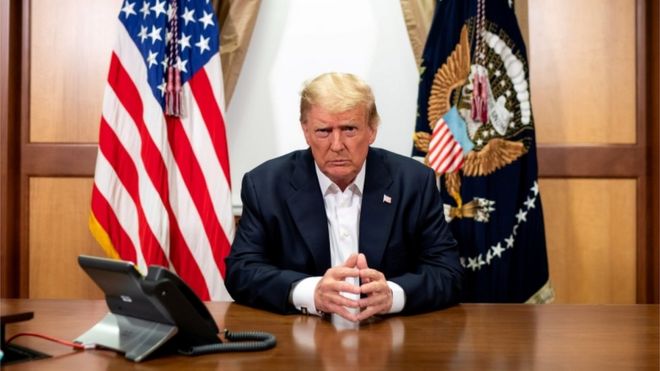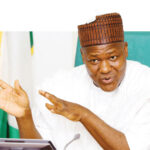“Winter is coming” was the foreboding mantra of the popular Game of Thrones TV show, in which the fog of winter heralded the coming of the Night King, whose implied aim was to end civilisation.
It has been winter in the US for a while now, but last week was so cold that the inauguration of Donald Trump as president was moved indoors. It was the first time since 1985 that this would happen. This time, though, there is a sense of foreboding that perhaps was not present when Ronald Reagan was sworn in. This time, it did feel like the Night King of American politics had made landfall and nothing would be the same after.
Since then, a slew of executive orders have been signed, policies and treaties have been reversed and deleted, and hundreds of undocumented immigrants have been hounded, captured, and deported, shackled and cuffed in scenes reminiscent of POWs of ancient battles being banished into the wastelands.
That moment was a culmination of yet another cycle of the American electoral process and ushers in the next administrative cycle that no doubt will be characterised by tears (cue in Selena Gomez), blood, drama, angst, and confusion.
- Hamas rejects Trump’s relocation proposal for Palestinians
- Akpabio, Abbas move to make N/Assembly clerk’s appointment merit-based
It is fascinating that the American and Nigerian electoral cycles are so close yet so distinct, considering that the Nigerian presidential system of government is modelled after the US version. With the elections just over a year apart, there are grounds for these models to be looked at and discussed in the same breath, at least for someone like me, who has been researching political communication in Nigeria’s election and governance system.
The 2024 American presidential election and the 2023 Nigerian presidential election are significant events in their respective democracies, marked by unique challenges and distinctive voter experiences. This column aims to compare these elections, particularly highlighting lessons Nigeria could glean for future electoral processes.
Already, Nigeria has started thinking ahead to the next elections in 2027, with a confab in Abuja recently rehashing all the problems that have persistently plagued elections in Nigeria.
In terms of the context of these two elections, there are some notable similarities in the candidates. Both elections were fiercely contested; in both instances, they were seen as pivotal battles for the souls of the country. The problem was that for a long time, it felt like watching a fierce sword and sandal fight between geriatrics. Tinubu and Atiku were past 70 at the time of the elections, and Trump and Biden, his original opponent, were well past that.
The introduction of outsiders or left-field options in the races—in Nigeria, Peter Obi and Kamala Harris—gave the election some more oomph and impetus but not enough to change the outcome. Perhaps if both these outside options’ parties had handled things better, the elections could have had different outcomes.
The Democrats in America should have known early enough to ease Biden out of the race when it was evident his age and dementia would count against him. They could have had a greater opportunity to have a wider field of candidates to choose from. Their failure to be firm with Biden cost them this election, and in the end, Harris stepped in too late to run against a Trump who had been on the run for office since 2016.
The same could be said about the PDP. The party’s inability to handle the fallout of its primary elections well led to Peter Obi defecting to the Labour Party to start a late run at the presidency. It also led to the exit of other party stalwarts, like the five disgruntled governors who helped torpedo the party’s chances of winning the elections.
In the US, Trump trounced Vice President Kamala Harris through a campaign that focused heavily on economic concerns and traditional conservative values and was notable for its direct engagement with voters through social media platforms and live events. Trump managed to energise his base effectively, leveraging a campaign style that emphasised bold rhetoric and grassroots mobilisation. In contrast, Harris sought to target moderate and undecided voters, employing a multifaceted strategy that included outreach to suburban women and minorities.
On the other hand, Nigeria’s 2023 presidential election was ironically the most fiercely contested since the end of military rule, yet the one with the lowest voter turnout, with Bola Tinubu emerging victorious amid a backdrop of economic turbulence and social unrest.
The American elections also witnessed a low turnout despite the rhetoric and saw a voter turnout of approximately 63.9 per cent, slightly lower than the record set in 2020 but still reflective of high engagement. It would seem the Americans were more eager to get Trump out in 2020 than they were in getting Harris in in 2024. However, the effective campaign strategies, broad media coverage, and intense public interest stemming from divisive issues such as immigration, economic inequality, and public safety made this election hotly contested.
In Nigeria, the turnout was comparably lower, with widespread concerns regarding voter suppression and disengagement among the youth. While social media played a significant role in mobilising voters, as was the case in the US, especially among the younger demographic, the pervasive issue of misinformation hampered their effectiveness. A major lesson for Nigeria is the need for robust voter engagement strategies that emphasise transparency and fact-checking to combat disinformation effectively.
Donald Trump’s campaign utilised innovative digital strategies, employing platforms like X and Twitch to reach younger audiences directly. His approach illustrates the importance of engaging with constituents through their preferred communication channels. Additionally, podcast appearances and collaborations with influencers helped to reshape traditional campaign narratives, making them more relevant to younger voters.
In Nigeria, candidates contended with the challenges posed by disinformation and misinformation, particularly through social media. The 2023 elections revealed a gap in the effective use of digital platforms for political messaging. Future Nigerian elections could benefit from embracing digital communication strategies akin to those employed in the U.S., ensuring that candidates can engage with voters in a manner that is both effective and credible.
As a media scholar, it is important to point out that both elections demonstrated the profound role of the media in shaping public discourse. The American election was marked by extensive media coverage, not just of the candidates, but also of the issues at stake. However, the focus often skewed towards the “horse race” aspect of the election rather than substantive policy discussions. This was true in both Nigeria and the U.S., and this trivialised crucial issues that affect citizens’ lives, leading to a misinformed electorate. This is especially true in Nigeria, where the media landscape is similarly influenced by a few dominant voices, often plagued by partisanship and sensationalism.
Reflecting on the 2024 American elections reveals several crucial lessons Nigeria can incorporate into its electoral framework for future elections. The first is that Nigeria should foster more effective voter engagement strategies that emphasise transparency, outreach, and education, particularly targeting young voters who are often disengaged and will continue to be when the government continues to fail the people, as has been the case in the last few decades.
Second, it is vital for the electoral bodies to develop initiatives aimed at countering misinformation through fact-checking partnerships and educational campaigns that build digital literacy among voters. At the same time, a diversified media landscape that embraces various viewpoints will facilitate richer discussions about policies and candidates. Media should strive for impartial reporting, moving beyond sensationalism.
Crucially, Nigeria needs to create voter awareness and strategies to combat vote buying, which has been the bane of our electoral campaigns for decades. It doesn’t matter what anti-rigging mechanism we introduce; as long as Nigerians are too hungry and eager to sell their votes for a pack of noodles and soap bars, the democratic process will always end in tears.

 Join Daily Trust WhatsApp Community For Quick Access To News and Happenings Around You.
Join Daily Trust WhatsApp Community For Quick Access To News and Happenings Around You.
